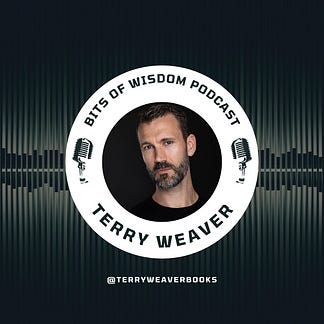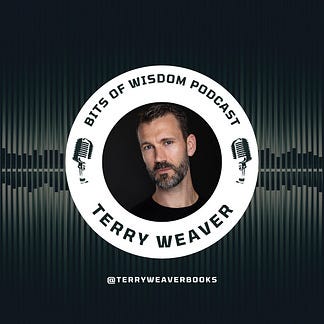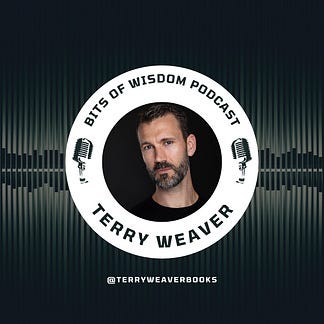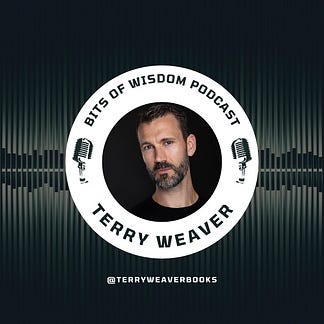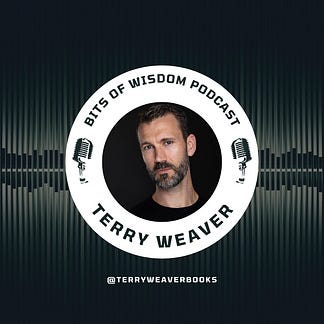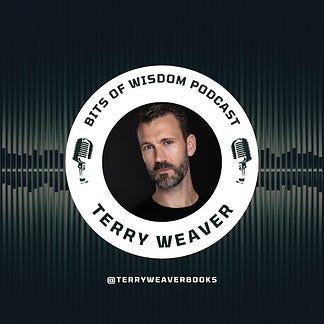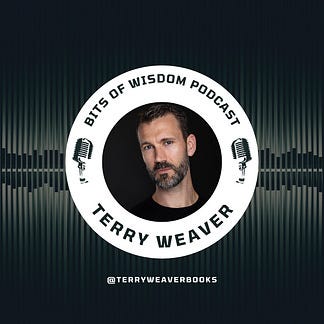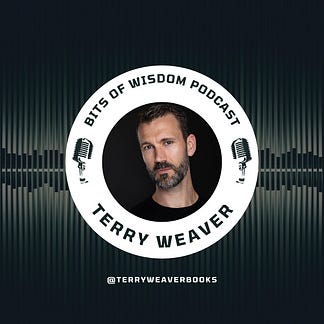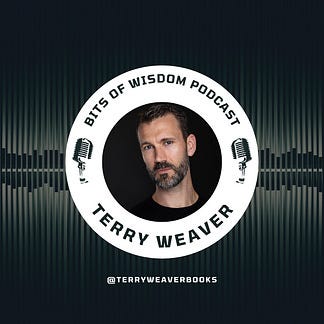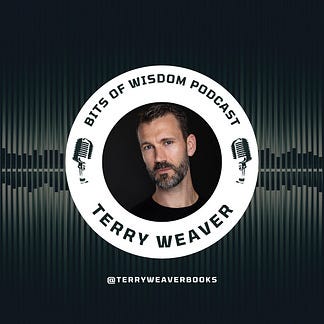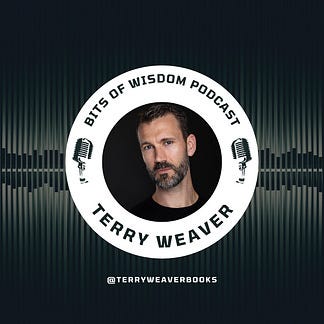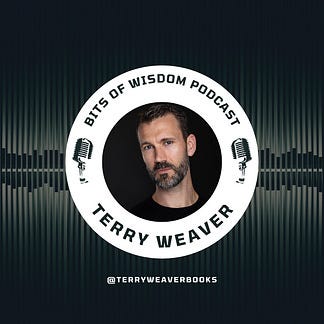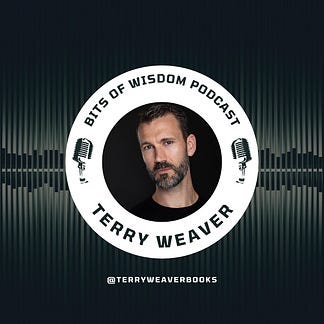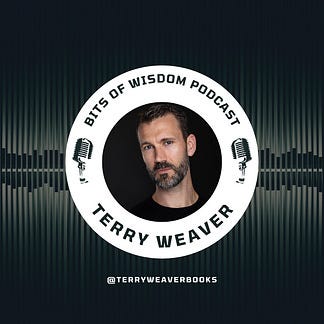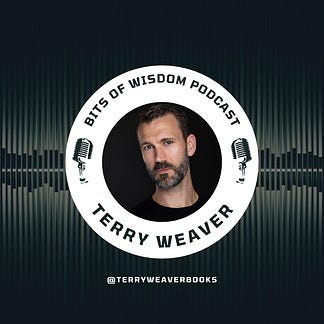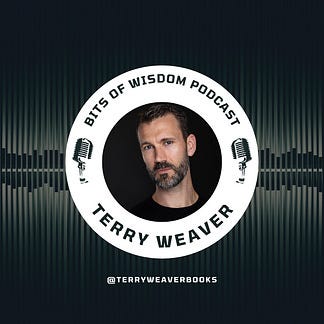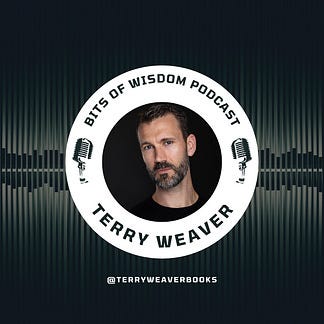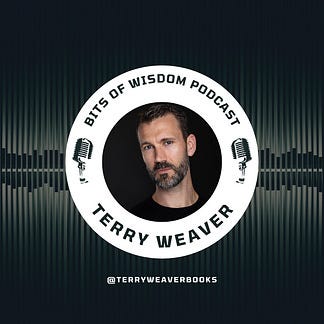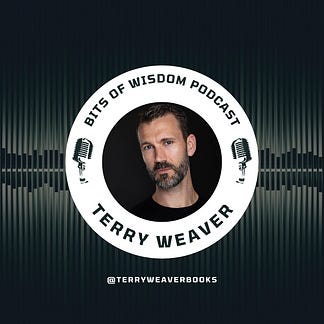Discover Bits of Wisdom with Terry Weaver
Bits of Wisdom with Terry Weaver

Bits of Wisdom with Terry Weaver
Author: Terry Weaver
Subscribed: 0Played: 0Subscribe
Share
© Terry Weaver
Description
Bits of Wisdom curated and read by Terry Weaver and delivered to you for inspiration.
terryweaver.substack.com
terryweaver.substack.com
58 Episodes
Reverse
“True happiness, we are told, consists in getting out of one’s self; but the point is not only to get out — you must stay out; and to stay out you must have some absorbing errand.” Henry JamesWhat is true happiness? How many people have found it? What percentage of our population lives in true happiness? I have only glimpsed it and grabbed ahold of it for moments, maybe a few days at a time, but True Happiness is something I continually strive for. Henry James had it right in my opinion — to have true happiness — we must get out of ourselves first and then figure out how to stay out. One of the best-selling books of all-time, The Purpose Driven Life, begins with the line, “It’s not about you.”The reason we have functioning bodies, the ability to love, empathize, and give is because we were made for others. Isolation and self-absorption are dangerous; they are a recipe for self-destruction.The hardest criminals on the planet are placed in solitary confinement and kept from human contact for two reasons: they are a dangerous and because a lack of human contact is painful. To be in isolation is a very real form of torture because it keeps us from what we were made for, others. Giving ourselves to others is the first part of Henry James’ statement; the second is having an ‘absorbing errand.’ What is an absorbing errand? It’s simply a purpose, passion, or mission greater than ourselves. It’s a personal striving that enriches those around us. If we can find our purpose, our fulfillment takes care of itself — our true happiness is a byproduct of doing what makes us come alive. “True happiness, we are told, consists in getting out of one’s self; but the point is not only to get out — you must stay out; and to stay out you must have some absorbing errand.” Henry JamesTerry Weaver is a reader-supported publication. To receive new posts and support my work, consider becoming a free or paid subscriber. This is a public episode. If you'd like to discuss this with other subscribers or get access to bonus episodes, visit terryweaver.substack.com/subscribe
“Most people are other people. Their thoughts are someone else’s. Their lives a mimicry, their passions a quotation.” Oscar WildeWhen struck with this statement, the question immediately came to mind, is this true of my life? To find out I inverted the statement:Most people are themselves. Their thoughts are uniquely their own. Their lives are original, their passions a reality.When I tested myself against these two opposites, I asked, which I’m closer to?This is a worthy exercise that can help us test the truth and authenticity in our lives. Are we being who we want to be? Are we who we were meant to be? Or, are we trying to become a version of acceptable or ideal? “Most of us have two lives. The life we live, and the unlived life within us.” Which are you living? Whose thoughts are you thinking? Who are you mimicking? What unlived life are you avoiding? “Know thyself” is a philosophical maxim that was inscribed upon the Temple of Apollo in Greece in the 5th century BC. It was by thinking, questioning, and exploring that the Greeks invented drama, philosophy, democracy, and Western civilization to name a few significant contributions. Questioning and exploring ourselves is one of the most worthy pursuits of life. I hope these Bits of Wisdom help you along the journey of knowing yourself. Remember, Most people are other people. Their thoughts are someone else’s. Their lives a mimicry, their passions a quotation.Terry Weaver is a reader-supported publication. To receive new posts and support my work, consider becoming a free or paid subscriber. This is a public episode. If you'd like to discuss this with other subscribers or get access to bonus episodes, visit terryweaver.substack.com/subscribe
“Birds born in a cage think flying is an illness.” AnonymousWhat’s caging you? What have you been born into that’s limiting you? When I first discovered this quote, it hit me hard because I was born into an ideology that still affects me today. The process of being born and raised in an ideology is often referred to as domestication. It’s important to understand that most of us are born and raised in some form of domestication. Governments, religion, education, clubs, cliques, and cults all carry belief systems their subjects are encouraged to adopt, sometimes for the good and sometimes for the bad; these systems become laws we live by. They can limit us and even cage us. I recently took an acting class led by Christopher Tramantana, a professor at the NYU Tish School of Drama. Professor Tramantana teaches ‘clown’ among other forms of drama, but he is most interested in the ‘clown character.’ He shared why.The clown is the ultimate creator; the unlived self. The clown has no shame, which is why he’s free to create.His statement got me thinking about the boxes life tries to put us in and the way we willingly allow it, and even assist at times so that we can ‘fit in.’ When we begin to realize we’ve been domesticated, and on some level born in a cage, we can make adjustments to help free ourselves and begin exploring our unlived lives, begin trying new things, and gain our wings to fly. Remember, Birds born in a cage think flying is an illness.Terry Weaver is a reader-supported publication. To receive new posts and support my work, consider becoming a free or paid subscriber. This is a public episode. If you'd like to discuss this with other subscribers or get access to bonus episodes, visit terryweaver.substack.com/subscribe
“Nobody can save you but yourself and you’re worth saving. It’s a war not easily won but if anything is worth winning then this is it.” Charles BukowskiMillions of people are drowning today, millions died yesterday and last week, and hundreds of millions in past years. Why? Because they were at war with themselves and didn't know how to overcome the battle within. Bad luck, fate, karma, or something else has a way of barreling down on us at times. I recently met a man who suffered from a tree falling on his head. He was placed in a medically induced coma and underwent multiple surgeries to repair the damage; this took place over many months as he healed. I later found out it happened when he was bull-dozing trees. Was this man struck with misfortune or mistake? Who will ever know? The misfortune we feel we’ve suffered is often no more than a series of bad decisions: to take another drink, or risk, or massage our pride or self-righteousness. These poor choices build up and eventually life reacts, and the choices avalanche upon us. If we maintain a victim mentality, we will have a tendency to look at life as unfair or even chalk consequences up as bad luck, but the thinking person will see that life is an accumulation of choices that either pay off or bankrupt us. Of course, there is a middle ground, but this message is for the person suffering for seemingly no reason, unaware they are drowning themselves. There is a common maxim in acting that states, “Never play the victim. It’s the weakest choice.” The same is true for reality. Victims seem to have tragedy in their blood. The man who left us the opening quote knows about drowning. He was an alcoholic, an abuser, and an all-around bad human until he realized at some point that:“Nobody can save you but yourself and you’re worth saving. It’s a war not easily won but if anything is worth winning then this is it.”Terry Weaver is a reader-supported publication. To receive new posts and support my work, consider becoming a free or paid subscriber. This is a public episode. If you'd like to discuss this with other subscribers or get access to bonus episodes, visit terryweaver.substack.com/subscribe
“Our plans miscarry because they have no aim. When a man does not know what harbor he is making for, no wind is the right wind.” SenecaThere’s great power locked up in this small statement. We should ask ourselves often, where are we headed? In what direction is our life pointed? What goal or dream or pursuit have we undertaken? If someone were to ask, ‘What’s your major aim this year,’ could you answer? If we cannot answer this simple question, we may be lost in our direction. A person without an aim to her life, is likely to end up adrift on a sea of distraction. We can get lost on a sea of distraction for years before we know what’s happened.The wonderful thing about having an aim for our life, is even if we miss our target, we are closer than when we started, and when we look back, we see progress and purposeful ambition; this is fulfilling in and of itself. Without a definite aim, it’s hard to see progress. Without an aim, our life begins to wander, and before we know it, we’ve wasted one of the finite resources we have. Time and tide wait for no man.One of the best ways to resolve this issue and find a definite aim, is to create one. You can develop a life mission, vision, and purpose statement, and these will give you something to point your life at. They can act as a compass when you become adrift.Having a vision statement in life gives us a guide to navigate the myriad of distractions and pitfalls that often take us away from our purpose and prevent us from living a life of significance. I’ll leave you with an example—my life vision statement. This small statement has helped me stay on track, especially when life has gotten tough and I felt discouraged. Inspire those I love and the world through my faith, creativity, and writing. Terry Weaver is a reader-supported publication. To receive new posts and support my work, consider becoming a free or paid subscriber. This is a public episode. If you'd like to discuss this with other subscribers or get access to bonus episodes, visit terryweaver.substack.com/subscribe
“Anything real begins with the fiction of what could be. Imagination is therefore the most potent force in the universe, and a skill you can get better at. It’s the one skill in life that benefits from ignoring what everyone else knows.” Kevin KellyWhen was the last time you used your imagination? Did you know there’s power locked up in it? Power to invent, to bring ideas to life. Believe it or not, your imagination has the power to change the world, maybe not the entire world, but don’t count that out. It’s been done before by the likes of Jobs and Disney to name a few; your imagination certainly has the power to change your corner of the world, and maybe more.Has someone else’s imagination changed your world, even if it was temporary? Have you been engulfed in the fictitious world of Harry Potter or Lord of The Rings? Have you slipped into the world of The Avengers in the last few years, or maybe you’re a little more sophisticated and enjoy being transported to the mid-1900s while watching The Crown. The magical moment for me was when I watched E.T. the Extra Terrestrial for the first time. I was completely captivated by Steven Spielberg’s magical world for ninety minutes. Afterward, I had a desire to search for my own Extra Terrestrial. Before television, families and friends would gather around the radio in order to escape into a different world. Before radio, we relied on books and theatre to tantalize our imaginations. Leaving reality and escaping into someone else’s fictitious world is one of America’s greatest pastimes. This is the power of imagination; don’t discount it, and don’t forget that you have this power. I’ll leave you with something uttered by the inventor of the theory of relativity, a man who had a profound impact on all of us, someone regarded as a genius of the 20th century. Albert Einstein left us with this simple statement,“Imagination is more important than knowledge.” Remember, anything real begins with the fiction of what could be. Imagination is therefore the most potent force in the universe, and a skill you can get better at. It’s the one skill in life that benefits from ignoring what everyone else knows.Terry Weaver is a reader-supported publication. To receive new posts and support my work, consider becoming a free or paid subscriber. This is a public episode. If you'd like to discuss this with other subscribers or get access to bonus episodes, visit terryweaver.substack.com/subscribe
“As far as we can discern, the sole purpose of human existence is to kindle a light of meaning in the darkness of mere being.” Carl JungIt’s the beauty and poignancy of well-constructed thoughts like Jung’s that have the power to inspire—to kindle a light of meaning in the darkness. It’s powerful ideas like this that inspired me to become a writer. Jung’s statement holds both simplicity and sophistication, which makes it poignant and pregnant with depth. Leonardo da Vinci’s statement, “Simplicity is the ultimate sophistication,” rings true. But what is the darkness of mere being? Without direction or purpose, we fall into stasis, a sort of directionless humdrum. It’s a painful state that many suffer from. Mere being is a given; it takes relatively no energy to maintain it, and therefore, it is a sort of purposeless existence. If we are merely being, we know it, and this knowing has the ability to drag us into a sort of depressed paralysis. But when we have meaning, everything changes. When we have a purpose, our entire outlook on life shifts. We see sparks of genius all around us. Meaning perpetuates an internal drive that ignites activity, a self-generating force that’s undeniable. Those with purpose feel it, and those around them see it. Those with meaning are motivated to continue whatever it is they are seeking. When we have meaning and purpose, the path appears before us; we are no longer lost; instead, we are spurred along the journey, a sort of self-fulfilling destiny.If you are in a state of mere being, study these words and make it your mission to find purpose. You’ll notice that even the searching will fuel you and inspire those around you. It will imbue you with life. As far as we can discern, the sole purpose of human existence is to kindle a light of meaning in the darkness of mere being.Have you enjoyed this writing? Share it with someone who might benefit from it. Terry Weaver is a reader-supported publication. To receive new posts and support my work, consider becoming a free or paid subscriber. This is a public episode. If you'd like to discuss this with other subscribers or get access to bonus episodes, visit terryweaver.substack.com/subscribe
“The canvas is its own reward.” Steven PressfieldThis tiny quote comes from the book, The War of Art. It’s a book I’ve recommended and given away more than any other. I own the physical book but also have the audiobook, which I’ve listened to more than fifty times. Just last week a friend sent me this message.Terry, thank you so much for recommending The War of Art! I finished it yesterday … what a motivating book! My reply to him was…I’m so glad it spoke to you. It is pretty wild, I was listening to the audio version of the book today.I tell you all of this to say the book has had a profound impact on my life. It’s helped me write five books, a screenplay, and complete many other creative works. Here’s the point. If you have a desire to do something creative, the way you view that creative act is just as important, if not more important, than the actual creating. This truth extends to all acts of creativity.The canvas, as Steve says, is the reward. The act of doing can usher in the reward if we view it in the right context. If we change our focus to the creation, instead of the finished product, we can realize the immense benefits of being a creator. Prolific artists understand this.“Practice any art, music, singing, dancing, acting, drawing, painting, sculpting, poetry, fiction, essays, reportage, no matter how well or badly, not to get money and fame, but to experience becoming, to find out what's inside you, to make your soul grow.” Kurt Vonnegut I hope this encouragement speaks to you, and helps you take one more step in your creative journey.Terry Weaver is a reader-supported publication. To receive new posts and support my work, consider becoming a free or paid subscriber. This is a public episode. If you'd like to discuss this with other subscribers or get access to bonus episodes, visit terryweaver.substack.com/subscribe
“Your thoughts construct patterns like scaffolding in your mind. You are really etching chemical patterns. In most cases, people get stuck in those patterns just like grooves on a record and they never get out of them.” Steve JobsHerein lies the power and danger of our minds. When something significant happens in life, patterns are etched into our psyche. It could be meeting our first love or losing her. It could be a traumatic event or a celebration. And it can be something as small as someone we respect telling us we’ll never succeed. These types of significant events leave marks on us, and if we are not aware of their power, we might replay them in our minds until permanence sets in. Think back to your childhood, to a time someone you respected said something to you that’s stayed with you for more than a decade. This is the power of words; it’s how they can etch patterns into our minds. It’s important to realize we hold this same power. The things we say to others have the power to cut them down or build them up. We get to choose. But, what most fail to realize is we have the same ability to etch patterns into our minds. The power to face ourselves in a mirror and repeat something every day until we begin to believe it and then act accordingly. Jim Carey’s story is a powerful example. In 1985, he wrote himself a check for 10 million dollars. In the memo line he wrote ‘For Acting Services Rendered.’ He post-dated the check for 10 years later, hung on to it, and referenced it often. In 1994, he was cast in the hit movie Dumb and Dumber. Can you guess how much he was paid for that role? If you guessed 10 million, you’re correct. Our minds hold more power than we know. We can etch patterns into our thinking if we are proactive with this power. This can be a very positive thing. So remember, your thoughts construct patterns like scaffolding in your mind. You are really etching chemical patterns. In most cases, people get stuck in those patterns just like grooves on a record and they never get out of them.Terry Weaver is a reader-supported publication. To receive new posts and support my work, consider becoming a free or paid subscriber. This is a public episode. If you'd like to discuss this with other subscribers or get access to bonus episodes, visit terryweaver.substack.com/subscribe
“Growth is painful. Change is painful. But nothing is as painful as staying stuck somewhere you don’t belong.” Mandy HaleThe pain of not belonging usually begins in the heart. It’s a signal to move that we ignore until misery begins to set in. When we ignore the signal, pain begins to manifest; it sometimes shows up as anger or frustration, and it often leads to an inevitable end. I remember the feeling of being stuck many times in my past. It began as a slow realization that I was in an environment I could no longer serve, and one that could no longer serve me. I could not fix this feeling, it was something in my gut or heart telling me it was time to go, and I waited too long, but eventually left. When this realization settles in, it is time to begin looking for what’s next because your happiness and future potential depend on your courage to go. Change is scary. Unknowns are pervasive and frightening, so it’s good to look back at survey all the times we have gone hungry or were without shelter. Most will realize, that the instances are few, or non-existent. This can give us the necessary courage to move and make a necessary change. It is also important to know that growth is impossible without change. One way to look at this change is by viewing our life as a story, with each phase being a chapter. We will never know exactly how the book ends, but we can decide to end one chapter and begin another when we feel the time is right. This is necessary for growth and it’s the only way to become a co-author of our destiny. So remember, growth is painful. Change is painful. But nothing is as painful as staying stuck somewhere you don’t belong.Terry Weaver is a reader-supported publication. To receive new posts and support my work, consider becoming a free or paid subscriber. This is a public episode. If you'd like to discuss this with other subscribers or get access to bonus episodes, visit terryweaver.substack.com/subscribe
“I had always believed that the world involved magic: now I thought that perhaps it involved a magician. I had always felt life first as a story: and if there is a story there is a story-teller.” G.K. ChestertonThere’s no wonder why Chesterton was nicknamed the Prince of Paradox. We don’t have to investigate much to conclude that the most complex things in this world have a creator, a designer, an author. Artificial Intelligence seems to be an oxymoron at first discovery until you understand that it’s the future, that people are dropping out of Ivy League schools to take part in AI start-ups. It’s the most revolutionary breakthrough of the 21st century, comparable to the internet revolution. And, it has a designer, millions of them, soon to be billions. We can look at any complex thing, a neural network, a transportation grid, or the latest rocket technology that now enables spaceships to re-enter Earth’s atmosphere and land safely upon return from the moon. These have designers. Recently, the film Oppenheimer showcased the breakthrough of the Quantum Theory of Molecules which enabled a team to design the Atom Bomb. A little less-known breakthrough by Biochemist Jennifer Doudna and microbiologist Emmanuelle Charpentier was the co-invention of the gene-editing system CRISPR, which allows the editing of DNA with unprecedented precision and efficiency.The evidence of a designer is all around us but it’s often thought to fall short when we look at ourselves in the mirror. Faith in a human creator seems to be risky despite the proof around us. It seems to be a paradox with just enough evidence to suggest it’s anything but absurd. Chesterton said it best in just a few short sentences. “I had always believed that the world involved magic: now I thought that perhaps it involved a magician. I had always felt life first as a story: and if there is a story there is a story-teller.”Terry Weaver is a reader-supported publication. To receive new posts and support my work, consider becoming a free or paid subscriber. This is a public episode. If you'd like to discuss this with other subscribers or get access to bonus episodes, visit terryweaver.substack.com/subscribe
“If your world doesn’t allow you to dream, move to one where you can.” Billy IdolThis world does not want you to dream. I know that’s a pretty black-and-white statement, but it’s true. When we dream big, we compete with other people’s dreams, at least that’s the way most people see it. Most people have a scarcity mindset that goes as follows: If you are winning, I’m losing, so join my team and help me chase my dream. The scarcity mindset maintains that the world and all it has to offer makes up a pie with a limited number of slices, and when someone takes a slice, there is one less for them. This is why most people want you around as long as you are serving them and their ambitions. There are some benefits to this way of thinking. It creates monopolies and billionaires, but it also fosters a dog-eat-dog mentality. This mentality incentivizes everything and wants to consume more than it needs. It’s important to recognize this system of thinking for what it is so that you can determine if you’re in an environment where you can dream. If you find yourself in a place where you’re not being encouraged to dream or chase your dreams, you can leave. You can pick up and move to another world where people appreciate ambition and share a growth mindset. This type of mindset believes there is enough opportunity for everyone to have a dream and encourages others to chase their ambitions. It’s also the type of environment where good, generous people will enter your dream and help you, knowing that the world does return the good that’s put into it.The world returns to us what we are. Remember, if your world doesn’t allow you to dream, move to one where you can.Terry Weaver is a reader-supported publication. To receive new posts and support my work, consider becoming a free or paid subscriber. This is a public episode. If you'd like to discuss this with other subscribers or get access to bonus episodes, visit terryweaver.substack.com/subscribe
“It was while helping others to be free that I gained my own freedom.” Anais NinWhat causes one to be imprisoned in their own mind? What causes someone to wage war in their thoughts? Where does depression, isolation, and self-loathing come from? Why is anxiety consuming our people these days?These are hard questions to answer, but what I know is that too much self-focus can create these outcomes. There’s a cornerstone principle in recovery groups. Those in recovery are taught that it’s nearly impossible to stay sober without helping someone else with recovery. Service to others is paramount when trying to recover from self-abuse and any kind. But why is that?When we serve others, it’s hard to be consumed with ourselves. I believe this is the key to happiness, but don’t take this from me; instead, take it from those who have served greatly and left a mark on history. Here’s what they say.“A life not lived for others is not a life.” Mother Teresa“I don’t know what your destiny will be, but one thing I do know. The only ones among you who will be really happy are those who have sought and found how to serve.” Albert Schweitzer“Life’s most persistent and urgent question is, what are you doing for others.” Martin Luther King Jr.I believe those who are most free and most satisfied in life are those who’ve found a way to serve others greatly. If you are living in misery, find someone who needs your help, and the very act of serving them will begin to set you free. My hope is that through these words of encouragement, I’m able to serve you. Terry Weaver is a reader-supported publication. To receive new posts and support my work, consider becoming a free or paid subscriber today. This is a public episode. If you'd like to discuss this with other subscribers or get access to bonus episodes, visit terryweaver.substack.com/subscribe
“Keep your face always toward the sunshine, and shadows will fall behind you.” Walt WhitmanHow do we keep our faces pointed toward the sunshine? A theme throughout human history has been that light is good and darkness is bad. We associate evil with the shadows, the ominous, the unseen. There is a generalized fear of the unknown, and what lies in the shadows is unclear. We associate goodness with light, and we’ve all heard the warning that the eyes are the window to the soul. Might Whitman have been suggesting we keep our eyes fixed on the good? If so, how do we do this?What we allow into our minds has to go somewhere, and what we focus on has great influence on the quality of our lives. The messages we hear, the songs we adore, the media we consume, when they enter our minds, they don’t just vanish, they go somewhere, and they affect us, and some of these inputs stay with us our entire lives. So the question becomes what are we allowing into our life and where is our focus? Are we seeking the good and fixing our eyes on it? Are we relishing the positive aspects of our life? One way to fix our eyes on the good is to remind ourselves of what’s good in our lives—through a gratitude journal or positive affirmations. We can be proactive about fixing our eyes on the good. Remember, Keep your face always toward the sunshine, and shadows will fall behind you.Terry Weaver is a reader-supported publication. To receive new posts and support my work, consider becoming a free or paid subscriber. This is a public episode. If you'd like to discuss this with other subscribers or get access to bonus episodes, visit terryweaver.substack.com/subscribe
“I cannot remember the books I’ve read any more than the meals I have eaten; even so they have made me.” Ralph Waldo EmersonWhen Emerson shared these words, there was no mass media, motion pictures, or Facebook. Then, only books, newspapers, and plays had a profound influence on culture. Today we are flooded with media competing for our attention. It’s everywhere we turn. It’s hard to realize how media shapes us until we think back to when we were kids in front of the television and reminisce about the shows we loved. These, consciously and subconsciously, helped form us. This is a powerful realization. It can serve as a warning to our youth and also help us understand the way we think. Everything we allow in our minds affects our personality, emotions, and thinking. Think back to your most recent dinner with friends, when people around the table almost robotically began quoting movie lines or excerpts from books. Media leaves an imprint on us. This is the same reason we share recommendations with others. Have you seen that movie? Have you read that book? Why do we do this? We passionately recommend the things that have deeply affected us, that have imprinted us. We’ve all heard we are what we eat. Equally true is—what we consume is, in some small way, consuming us—especially the media we allow into our lives. Emerson’s words remind us, it’s hard to remember the books we’ve read any more than the meals we’ve eaten; even so they have made us.Terry Weaver is a reader-supported publication. To receive new posts and support my work, consider becoming a free or paid subscriber. This is a public episode. If you'd like to discuss this with other subscribers or get access to bonus episodes, visit terryweaver.substack.com/subscribe
“Being aware of a single shortcoming within yourself is far more useful than being aware of a thousand in someone else.” Dalai LamaThe only person in this world whom we can guarantee change in is ourself. Have you ever sat with a psychologist or seen one played in a movie? Then, maybe you’ve noticed their chief tool for therapy. It’s the question. Why is this? To unearth realizations about self. Human psychology is such that self-realization is the real catalyst to change, so a therapist who wants to help her patient, asks questions that may lead to realizations. When a person has become aware of a shortcoming within herself, she is far more likely to make a change. Conversely, if someone tells her she is wrong and needs to change, the human tendency to become defensive and retaliate kicks in. This is how we know one’s quality of life is, to a large extent, an inside job. This is also why looking for shortcomings in others is a waste of time. However; being open to knowing more about one’s own shortcomings can enable change and growth. This growth within can inspire change in others by way of our example. There’s a wise saying in recovery groups that goes like this, just focus on keeping your side of the street clean. The reason this one-liner is so handy to remember is because we can never force change in someone else. That’s their job.This is why, being aware of a single shortcoming within yourself is far more useful than being aware of a thousand in someone else. Terry Weaver is a reader-supported publication. To receive new posts and support my work, consider becoming a free or paid subscriber. This is a public episode. If you'd like to discuss this with other subscribers or get access to bonus episodes, visit terryweaver.substack.com/subscribe
More than 2500 years ago, Heraclitus uttered the words, “Character is destiny.”When we make references to people we admire and trust, it’s because of what they have done. When we warn those we love to stay away from an individual, it’s because of their actions. We are known by what we do.He’s a teacher.She’s a photographer.My brother is a student.This is why, in part, I see the truth in Heraclitus’ statement. Action is character, and character is what defines us, not what we say, not how we feel, but by the way we interact with those around us. It’s how we’ll be known.We’ve all heard that talk is cheap. The proof is in the empty promises we hear escape the mouths of politicians. These days, there’s an entire industry built of talking heads who contradict and confuse.So how can we trust someone who seems to be made of words alone? The answer is, it’s impossible. We learn to trust one by watching their actions. This is what defines character, and character is everything. The old saying, our word is our bond, is only true if held up by action.The statement by Greek philosopher Aesop, “when all is said and done, more will be said than done,” is wise. He had it right in the 6th century BC.Equally true is that we can know more about a person by watching them, not by hearing or talking to them, but only by observing one’s actions can we truly know who they are. Character is action, and character defines a life. Character is destiny.Remember, every little action of the common day makes or unmakes character, and that therefore what one has done in the secret chamber of one’s heart has to some day cry aloud on the housetop. This is a public episode. If you'd like to discuss this with other subscribers or get access to bonus episodes, visit terryweaver.substack.com/subscribe
“Generally speaking, the errors in religion are dangerous; those in philosophy only ridiculous because religion seizes more strongly on the mind.” David Hume If everyone is right, then no one is right because everyone is different. This logic is easy to follow. Every religion I’ve encountered claims to be right. If we follow the same logic, does this too mean that every religion is wrong?That would be a great claim, but without a second thought, the claim that errors in religion are dangerous seems to be true knowing a few outliers in religious history. So with all religions claiming to be the way, how does one filter through the errors? By its nature, philosophy seems to be more suggestive. A way of thinking for a time. Tools that can be picked up, applied, and discarded when no longer needed. Philosophy tries to expose principles to aid in the life journey. It tends to operate in the gray, with fewer claims of absolute truth. Religious claims tend to be black or white, right or wrong, all or nothing. Herein lies the danger in Hume’s warning. When someone adopts religion wholesale, they are dangerously armed with an illusion, an ability to parse the righteous and reprobate and discard anything or anyone that doesn’t fit in their system of beliefs. The spare room once used for thinking is boarded up, and debate is traded for rules and commandments. This is the point of danger—when thinking is traded for tradition and pre-packaged thoughts. Still, a quick study of history shows that religion has helped shape and preserve societies through time, and many of the most respected atheists and researchers have concluded that, as a whole, religion is beneficial to societies. However, when individuals trade their thought for religion, the scales can tip, and the fringes of religion can become dangerous, even deadly. So remember, if everyone claims to be right, then no one is right because everyone is different, and generally speaking, the errors in religion are dangerous; those in philosophy only ridiculous because religion seizes more strongly on the mind.Terry Weaver is a reader-supported publication. To receive new posts and support my work, consider becoming a free or paid subscriber. This is a public episode. If you'd like to discuss this with other subscribers or get access to bonus episodes, visit terryweaver.substack.com/subscribe
“The difficulty lies, not in the new ideas, but in escaping from the old ones, which ramify, for those brought up as most of us have been, into every corner of our minds.” John Maynard Keynes As we age, the new becomes harder. It’s not an easy matter to adopt a new mindset because of what our current mindset is built on. It’s a matter of deconstructing systems that have ingrained our thinking for decades. One of my favorite authors likes to say, we are only as young as the last time we changed our minds, and there’s something to this. Changing our minds gets more difficult as we age. The ability to think in the abstract or consider the radical becomes a rigorous exercise because we’ve been influenced and shaped by societal norms, religion, authority figures, and law. These explicit and presumed teachings become our dogma.It is good then, if you want to stay open to change—which is the only path to growth—to study alternative ways of thinking and behavior. If you vehemently disagree with someone, try learning the philosophy of your opponent. Sit and have a conversation with someone of another creed, religion, or political party. It’s easy to despise someone until you sit down and recognize the shared humanity in their eyes, and only then can we be open to an understanding that leads to compassion. As we age, we construct a world that is safe and known, a world that is black and white, an environment where we can easily distinguish threats. But the threats we are guarding against are usually nothing more than fears and preferences we’ve developed within our minds. To get to the new, something worthy of passion, a frontier of growth, we first have to figure out how to escape the old. George Bernard Shaw, one of only two men in history to be awarded both the Nobel Prize and an Oscar, may have said it best. Progress is impossible without change, and those who cannot change their minds cannot change anything.Terry Weaver is a reader-supported publication. To receive new posts and support my work, consider becoming a free or paid subscriber. This is a public episode. If you'd like to discuss this with other subscribers or get access to bonus episodes, visit terryweaver.substack.com/subscribe
“There is a story they tell of two dogs. Both at separate times walk into the same room. One comes out wagging its tail, while the other comes out growling. A woman watching this goes into the room to see what could possibly make one dog so happy and the other so mad. To her surprise, she finds a room filled with mirrors. The happy dog found a thousand happy dogs looking back at him, while the angry dog saw only angry dogs growling back at him. What you see in the world around you is a reflection of who you are.” This is a powerful truth. Every lasting, significant, and meaningful change begins with internal change. The way we view ourselves and the world is the foundation of how we will interact with it.Terry Weaver is a reader-supported publication. To receive new posts and support my work, consider becoming a free or paid subscriber. This is a public episode. If you'd like to discuss this with other subscribers or get access to bonus episodes, visit terryweaver.substack.com/subscribe



